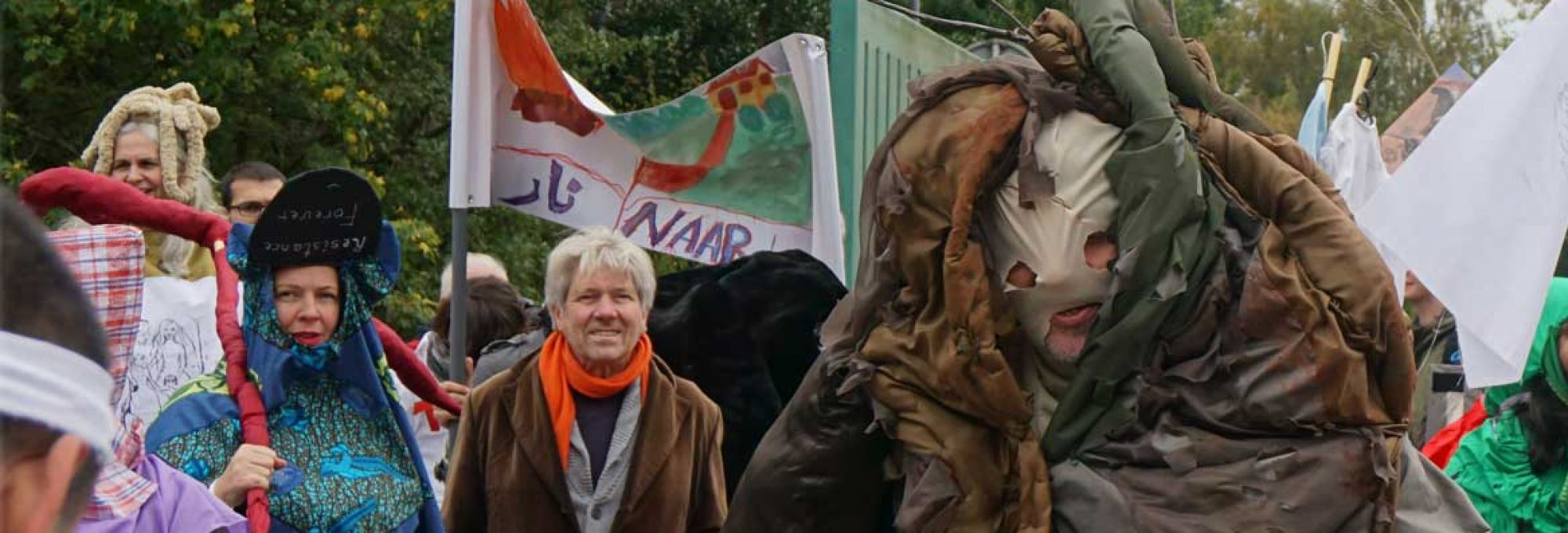How can participatory projects in the arts lead to the development of new creative methods and approaches to the local issues which at the same time have a global character?
In March of 2014 a new, unusual museum will open its doors in the Southeast of Amsterdam – The Moving Museum of Clothes. An international team of two curators and four artists together with the local citizens, will develop a special kind of (semi)public space where there is place for personal stories and secrets. It will be a museum of unexpected points of views, hopes, memories, disappointments, aspirations and a continuous search for a trustful environment.
Amsterdam Southeast (the Bijlmer) is known for its contradictory past and present. An embodiment of the belief in the coming Utopia, the perfectibility of human nature and the role of architecture as a weapon for social reform, the Bijlmer anno 2013 has to deal with the lack of sense of ownership of its residents in relation to their living environment and the lack of involvement in the life of the area and of the city. This is typical Bijlmer but also a typical suburb elsewhere: from Sao Paolo to Magadan.
Which possibilities can participatory projects in the arts create in order to engage citizens with their neighborhood and with each other? How can citizens of today become a meaningful and exciting part of a story of a contemporary city? The four participating artists work inter- and trans-disciplinary combining various media such as installation, performance, film, photography and text. Each of the artists has his own approach, strategies and tools which they apply in Amsterdam.
Gluklya (Natalia Pershina-Yakimanskaya) (NL/RF) sees clothing as a border between the interior world and the exterior social sphere. She is interested in clothing that performs an act of estrangement—in the sense explored by Brecht and Shklovsky. Through this act participants get a possibility to see things from a new and different perspective. Advocating that «The personal is political» the artist aims to conduct confidential conversation with citizens. Clothing in this situation is a veil that allows to construct a framework for the action; it’s much easier to talk about our clothes than about ourselves.
Olga Jitlina (RF) tries not only to describe or protest the tragic situations in which history, government and people’s own passivity put them but to make attempts to find the ways out with tools like humour, paradoxical interpretations and imagination. In the Bijlmer Jitlina plans to search for the new forms of being and working together which suppose to substitute the old forms which belong to the ‘fordisctic’ society.
The work of Jan Hoek (NL) is often about suppositions: how do people look at black and white, rich and poor, locals and foreigners. In the framework of The Moving Museum Hoek will collaborate with the citizens of the Bijlmer who are not always visible in the city, also not in their direct environment. Both the artist and the citizens will become makers while both parties have (and will continue having) different expectations of the involvement in the artistic process. The documentation of the process is in this case as important as the final result.
Masha Ru (NL/RF) researches various aspects of cultural backgrounds of contemporary citizens. For The Moving Museum Ru will put an emphasis on the interaction between the personal and national identity in relation to the choice of clothes by different participants for different situations in their lives. The stories and experiences of citizens will form a basis for the development of themes en techniques in Ru’s project.
The Moving Museum of Clothes is at this moment actively in development. In March of 2014 it will be possible to speak specifically about the research findings and project results. Which models of participatory practice give citizens a possibility to contribute to the project in a meaningful way? What kind of impact do participatory practices have on the territory of art, social work, politics and others in the neighborhood, in the city, nationally and internationally?
Irina Leifer, curator The Moving Museum of Clothes
Niki Lischow, curator The Moving Museum of Clothes
Irina Leifer is an initiator, researcher, producer, curator and regularly guest lecturer at the Reinwardt Academy (Amsterdam School of the Arts). Leifer conceptualizes, develops and realizes participatory projects in partnerships with cultural organisations such as museums and community centres, and in public space. Irina Leifer works in the Netherlands and internationally: functioning in a broader context she is able to experience and analyse how various participatory strategies work (or don’t work) in different cultural and social environments and to enrich projects in one country with the observations and conclusions made in another one. Examples of Leifer’s recent projects are collaborative Russian-Dutch project ‘Museums in New Towns: identity, image and participatory culture’ (Nakhodka-Zoetermeer) and ‘The Moving Museum of Clothes’ (Amsterdam).
Niki Lischow is an initiator, producer, curator and researcher. She is specialised in initiating and realising contemporary art projects in non-museum environments. The focus of her work is directed towards minority communities, often combined with Middle Eastern artists and audiences. Lischow works both in the Netherlands and internationally, where she uncovers relationships and builds new partnerships. Co-creation plays an important role in all her projects and her practical approach leads to long-lasting relationships with both artists and visitors. Niki Lischow’s projects include ‘Al Quds Underground Festival’(Jerusalem), ‘Live and work in Palestine’ (Berlin Biennale) and ‘The Moving Museum of Clothes’ (Amsterdam).
